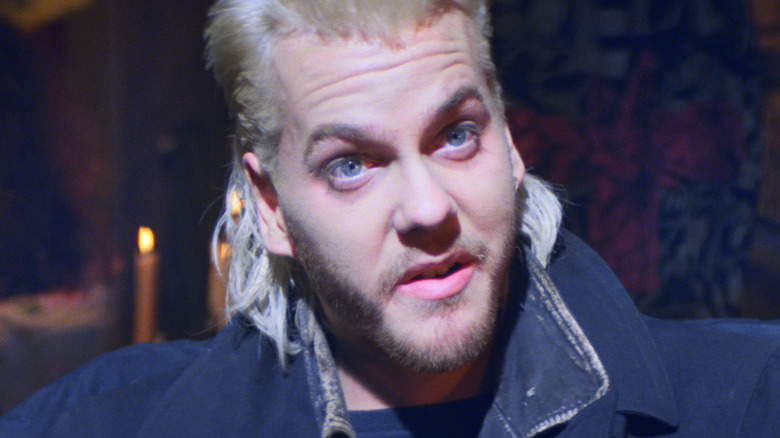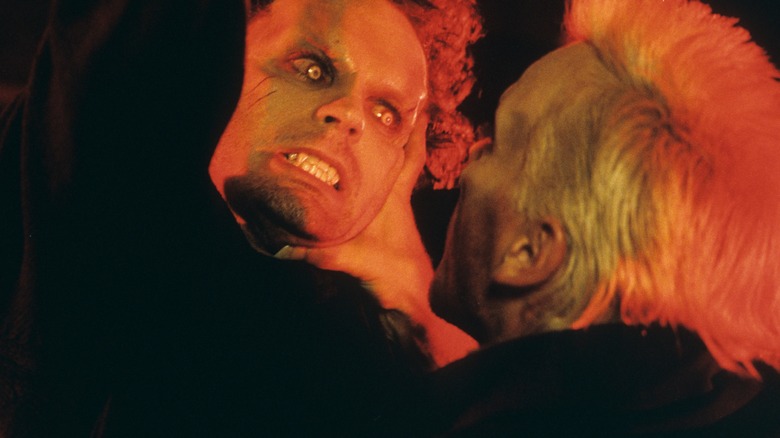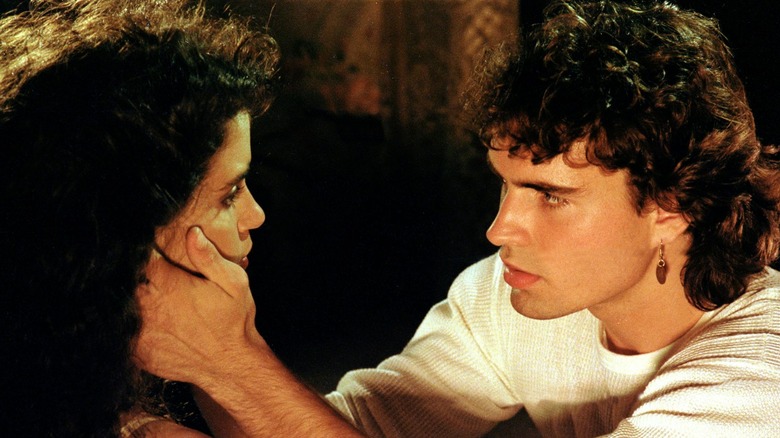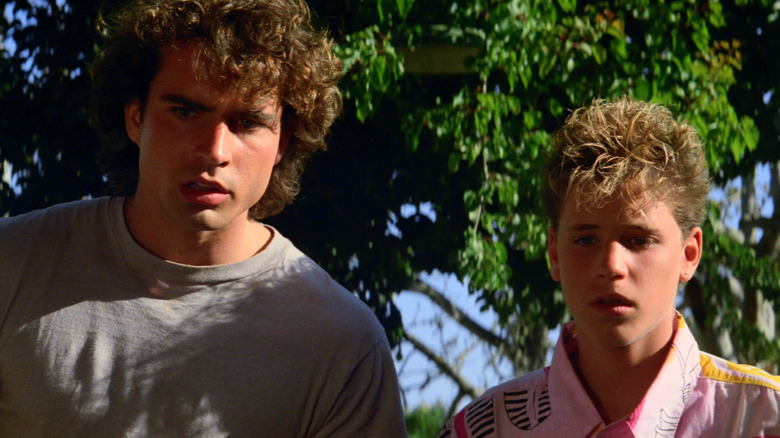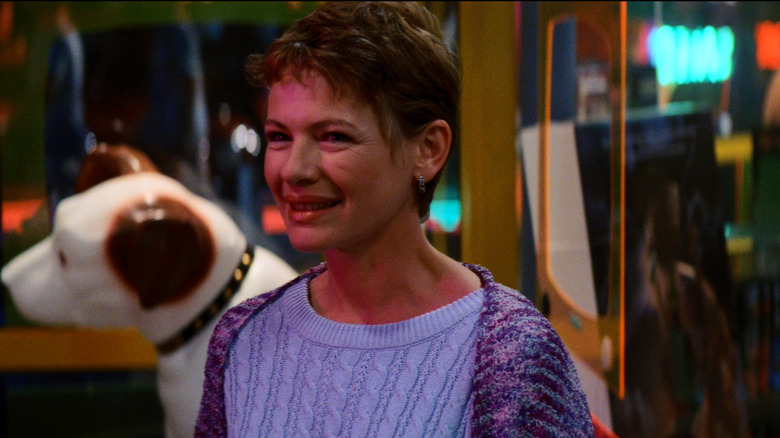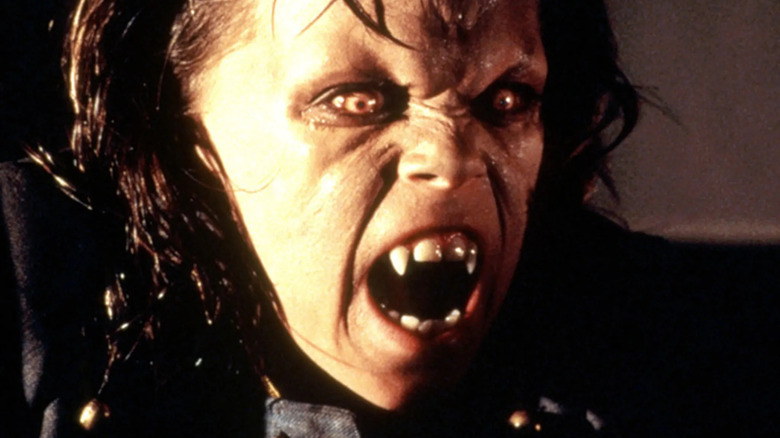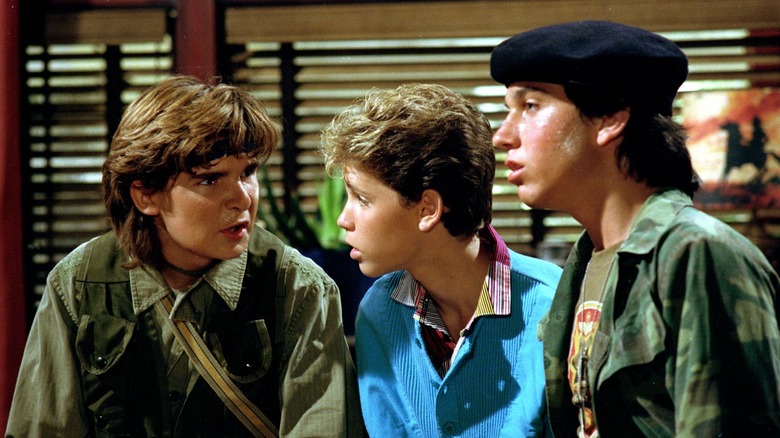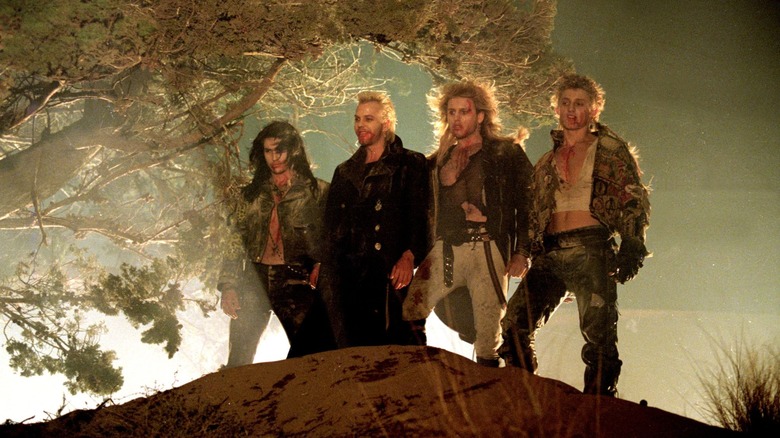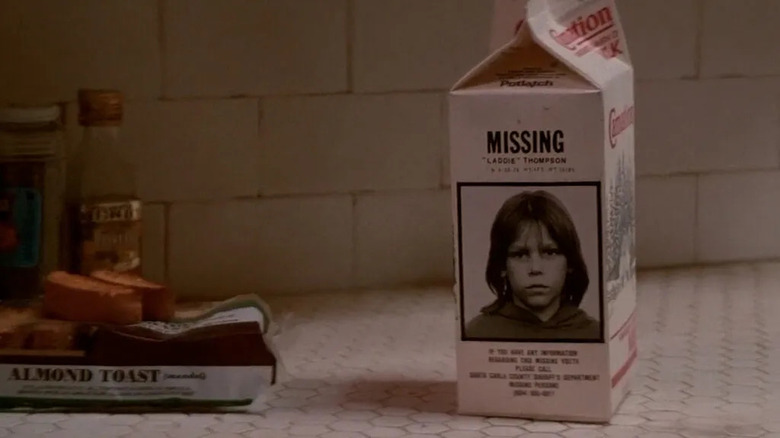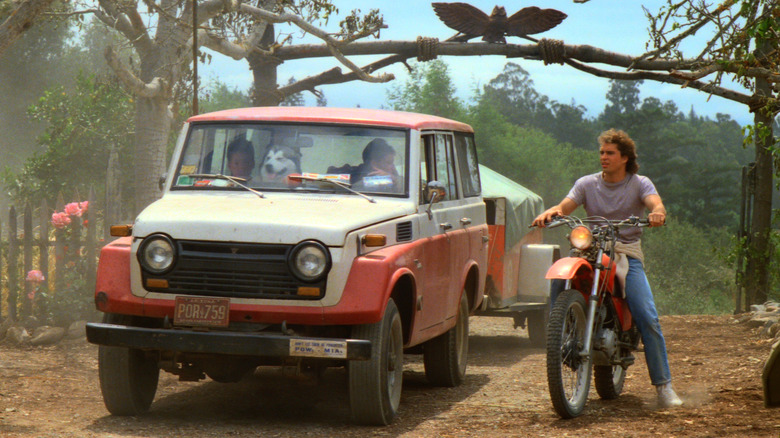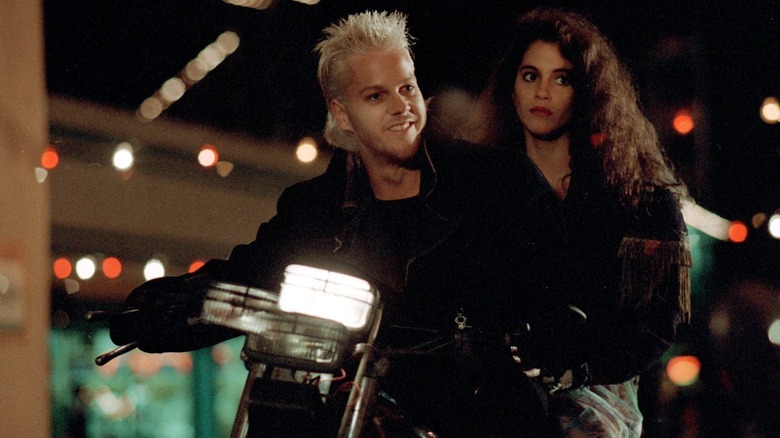The Ending Of The Lost Boys Explained
In 1987, a film about a family who moves to a California town that happens to be teeming with vampires arrived in theaters. Directed by Joel Schumacher and featuring a young cast led by Jason Patric and Kiefer Sutherland, "The Lost Boys" eventually became not only a box office hit but one of the most recognizable horror classics of the decade, blending the scary and the campy in a way that adult audiences still appreciate over 30 years later.
"The Lost Boys" won over its fans through a lot of elements, from the tongue-in-cheek allure of the story to the sex appeal of its leads, but it's also endured because of the way it builds a world within the confines of its narrative. It's a relatively intimate story, but within that intimacy there are many character wrinkles and bits of lore which shine through, creating many opportunities to daydream about where the characters end up, and what they might do in the future.
With that in mind, let's take a closer look at "The Lost Boys" from the perspective of the ending, examining all the things the film's conclusion means for our favorite characters and what it can tell us about what might happen next.
Michael's future
Michael (Jason Patric) enters "The Lost Boys" as a stranger in a new town, disappointed by the changing reality of life around him. His family has fractured, which leaves his mother, Lucy (Dianne Wiest), forced to make do by moving her children back in with their grandfather. That leaves Michael looking for a life outside of his family, in search of a new community and new interests. He believes he finds it in Star (Jami Gertz), a girl he's falling in love with, then thinks he may have found it again in David (Kiefer Sutherland) and his band of outsider friends.
Of course, before Michael knows it, he's hanging out with a coven of vampires, leaving both his family and his own humanity in grave danger. His quest to fight David and end the vampire bloodline, therefore restoring his mortality and saving his family, is in essence a metaphorical journey to find a balance between the old and new versions of his family. His struggle teaches him that his mother and his brother Sam (Corey Haim) are valuable and important to him, but it's also teaches him that he can create a new family for himself in the outside world, so long as he's careful which friends he chooses to bond with. It's a lesson that he'll take with him into the wider world.
Michael and Star
Michael's first meeting with Star plays out like a typical teenage meet-cute. They're both hanging out at the same party on a beach in Santa Carla listening to the same music when they notice each other. There's a very clear attraction right away, but that attraction is deeply complicated by what's happening in Star's life elsewhere. As a half-vampire, she's been claimed not only by another being but by another way of living, which makes her beholden to forces beyond her control.
Much of what draws Michael into the vampire way of life has to do with Star, and his feelings for her are also a significant motivator in defeating David so that they can escape and have a life together. Of course, there are also unspoken complications within this truth. There's a little bit of codependency at work in this connection between two outsiders, and if they're going to make it work in the long run, they're going to have to come to grips with both the twisted way they got together and the trauma they share after having escaped the vampires.
Michael and Sam
Michael and Sam begin the film with a classic big and little brother dynamic. They love each other, but Sam is in many ways still a young kid, one who is stuck in his own little world of comic books and television. Meanwhile, Michael is becoming an adult who'd rather ride his motorcycle and go to parties with girls than hang out with his little brother. This dynamic is heightened by the vampiric element in the film. Michael's changing physical nature and personality work as an excellent metaphor for the rift that forms between siblings when an older brother starts to go out on his own.
Of course, the battle against the vampires helps to repair this rift, particularly where Sam is concerned. In some ways, he can't stand his brother's changing ways, but he also can't let go of how much he loves Michael, so they have to find some kind of middle ground. Their relationship is put through the wringer but ultimately made stronger by the end. Michael realizes Sam is an important grounding element in his life, and Sam realizes that Michael needs to branch out — safely, of course.
Lucy's future
Lucy Emerson makes a drastic move out of necessity for the sake of herself and her children, which right away sets her apart as a distinctly selfless human. One of the first things she does in the film is offer money for food to homeless teenagers, and later it's clear that she's willing to work as hard as she has to in order to make a better life for her sons.
It's this selfless determination that catches the eye of Max (Edward Herrmann), the local video store owner who also happens to be Santa Carla's master vampire. At the end of the film, we learn that Max has orchestrated the entire vampire hunt with a focus on the Emerson family in order to eventually turn Lucy and make her a "mother" to his entire gang of rowdy vampire boys.
This is a startling and horrifying twist on Lucy's role in her family and the film. Beyond serving as a villain reveal for Max, the role he had planned for Lucy in the vampiric plot is bound to give her pause in the next phase of her life. With Max and his vampires gone, Lucy will have to again work to rebuild while dealing with the aftermath of a romance that ended in disaster. Further, this time she'll have to contend with the added reality of vampires. It's a tough shift, but if anyone can handle it, she can.
Laddie's future
Laddie Thompson (Chance Michael Corbitt) isn't a major character in "The Lost Boys." He's just sort of around, a boy half-vampire who spends most of his time with Star and is eventually cured along with her at the end of the movie, breaking the curse that's dominated his young life.
However, even if we don't know much about him, the implications of the end of the film for his character are fascinating. For one thing, we know he's a local missing kid because we see his face on a milk carton at one point. For another, he has the same last name as another of the vampires, Marko (Alex Winter), suggesting that there's a chance they too were brothers. Then there's his codependent relationship with Star, which could just be a straightforward bond or the result of living as half-vampires at the mercy of David and his gang together.
All of these things create some interesting questions to ponder when it comes to what happens to Laddie now. Will he go back to his family and try to be a normal kid? Will he need tons of therapy for what he's gone through? Will he just stay with Star and Michael forever? He's got a lot of future ahead of him, but what he's experienced will bring with it some unique challenges to overcome.
The Frog brothers
The Emerson family manages to survive their vampire problem, but they may not have been so lucky if not for the Frog brothers, Edgar (Corey Feldman) and Alan (Jamison Newlander). Though Sam initially dismisses the brothers as local nerds just trying to pick on him, it's clear eventually that the Frogs are among the only people in Santa Carla with real knowledge of the vampire problem in the town and how to potentially solve it. Of course, the problem is they have trouble convincing people to go along with their plans, but once they get some help, they prove to be capable enough vampire hunters.
So, what do the Frog brothers do now that they've not only proven that vampires are real, but fought and killed several of them? It's possible that they do nothing, stay in Santa Carla, and keep selling comic books while keeping an eye out for more vampire attacks. However, they could always take their vampire killing show on the road, trying to convince more people in more towns that there's a menace to be fought. Either way, they've got a bright future as weirdos on a mission.
Santa Carla's vampire problem
"The Lost Boys" is a relatively short movie, but it builds a fascinating world within the beachfront community of Santa Carla, a place with a thriving boardwalk scene that also happens to be a "murder capital" thanks to all the deaths and disappearances. Many of those deaths and disappearances are, we know, thanks to the presence of a gang of vampires who hang out in a ruined hotel destroyed by an earthquake nearly a century earlier, vampires who have ties to a local businessman who both protects and leads them.
By the end of the film, we know that the vampire problem is Santa Carla has been present for a while, as Grandpa reveals that he's known for some time about the creatures and the issues they create for the town. It's a fun last-second reveal, but it leaves so many more questions. Why did Max, as head vampire, choose Santa Carla as his headquarters? Why did he seem to exclusively recruit local youths to join his coven? How long have the vampires been operating in this area? It's hard to tell based on the ending, but it feels like there are deeper secrets and explanations at work — which is a big part of what makes the film so much fun.
Other vampires (and half-vampires)
Within the story of "The Lost Boys," the vampire community of Santa Carla feels relatively contained. You've got Max as the head vampire, David as the leader of the gang, and Star and Laddie as the half-vampires waiting to be turned. However, as the film shows us by the end, what we think we know about the world of the film isn't always the truth, which raises a number of questions about the film's vampires and how they work.
For one thing, we don't know that Star and Laddie are the only half-vampires out there. We know David and his crew spend significant time menacing the local populace, and we know that Michael was able to go home and basically live his life for at least a little while without being noticed for what he was. Are there other half-vampires within Santa Carla, either abandoned by David or working hard to stay away from him, who were also freed by Max's death? Beyond that, is it possible that Max and company have expanded their influence beyond Santa Carla? Are there other master vampires out there carrying on Max's work?
There are so many juicy questions at the heart of this story, it's no wonder the film spawned some less well-known direct-to-video sequels.
Family in all its forms
Though you can easily watch "The Lost Boys" as a fun, somewhat campy horror comedy packed with '80s fashion and a great soundtrack, there are deeper themes at work in the film, and many of them are centered on the notion of family. In their own way, as Max points out at the end of the film, the "lost boys" of the title are a family all their own, to the point that David cries when he realizes his brothers are being killed. Max genuinely wants to make his little family better, which is why he wants Lucy to join him in vampirism. It's twisted, but there's a meaning behind it.
On the other side of this coin, of course, you have the Emerson family and their struggles to get along in the wake of upheaval that moved them halfway across the country. Frustrated by his real family, Michael goes out looking for a new community, and though he thinks he's found it, what he's actually found is a demented version of the family life he already had. In the end, "The Lost Boys" is an exploration of family in all its forms — blood relatives, chosen family, and the kinds of messed-up family dynamics which teach us more about the kind of family we want for ourselves. For Michael, the film is a lesson in combining all three.
Surprising longevity
It's been more than 35 years since "The Lost Boys" arrived in movie theaters, and the film is not only still a favorite among longtime fans but is constantly earning new admirers. It's still regularly listed among favorite vampire movies for horror fans and non-horror fans alike, and certain moments are still instantly recognizable in the larger pop culture landscape. All this happened, according to star Alex Winter, despite the specificity of the film's story and design,
"It's such an idiosyncratic movie, that it never occurred to me that it would survive its era," Winter told SYFY on the film's 35th anniversary. "It felt like a movie for the '80s, about the '80s, and that it would be done when the '80s were done. And not in a disparaging way — it's such a specific movie to the times." Winter went on to explain that she introduced the film to her 12-year-old son at a London screening, and was happily surprised by his reaction. Winter recalled, "He had a great time. It just kind of reminded me that, 'Well, at the end of the day, it's an entertaining movie,' which is why I think it's stood the test of time."
